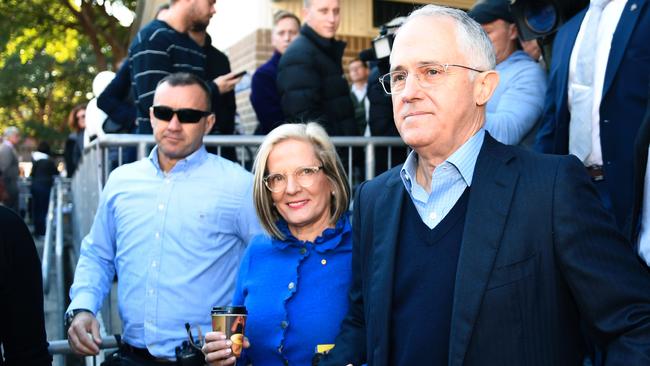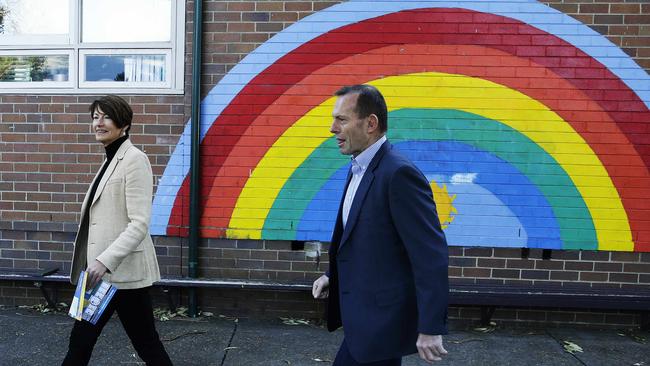Malcolm Turnbull not playing by the rules in election
MALCOLM Turnbull’s great escape from the media pack to catch a train to marginal seats on election day tells you a lot about a politician who refuses to play by the rules.

Opinion
Don't miss out on the headlines from Opinion. Followed categories will be added to My News.
MALCOLM Turnbull’s great escape from the media pack to catch a train to marginal seats on election day tells you a lot about a politician who refuses to play by the rules.
But there are some rules even the Prime Minister cannot escape. Convinced voters were sick of “juvenile’’ gotcha moments and political slogans he got mugged by the reality of a Labor Party scare campaign that worked. Last night, there was still the real possibility of a hung Parliament.
Labor believes it caught the Prime Minister napping in the final week, too confident he would win as they unleashed a brutal scare campaign on Medicare. It worked. The ALP polls tracked up consistently in the final days of the campaign. It was nailbiting stuff with the Prime Minister still holed up in his Point Piper mansion as the Labor Party dared to dream it could form government with the independents.
“Bob Hawke held government with 78 seats in a 148 seat Parliament in 1990,’’ a Liberal senator said last night.
“It’s too close to call.’’
Some MPs in the Turnbull camp were hopeful that a fragile government would put more pressure on the Abbott camp to behave. But the close result can only leave MPs questioning the Prime Minister’s judgment.
Securing a fragile mandate to govern from voters leaves the Prime Minister more vulnerable than ever to the conservatives who will never forgive his decision to roll Tony Abbott.
The Prime Minister has spent the first 290 days of his term as leader cleaning up the legacy issues of his predecessor Tony Abbott and crafting his own agenda.
If he can hang on, there are no more excuses.
He will also be forced to negotiate with a Senate that could prove more unwieldy than the last.
The Prime Minister has proved lucky. He is not a natural campaigner and his train escape suggests a man who does not enjoy always enjoy the media glare.
All the evidence including ALP polling pointed to a significant swing to Labor but not in the marginal seats it needed to win.
If the ALP records a two party preferred result of 49 per cent on election night the Prime Minister has been very lucky. The electoral pendulum tells the story that a swing of up to 3 per cent would deliver 9 seats to Labor but a 4 per cent swing would secure nearly double the number of seats — 19. That’s the magic number the ALP needed to govern.
But winning an election will not mean the Prime Minister is free to pursue policy whims on climate change, asylum seekers or same sex marriage. While the Prime Minister did play a leadership role in freeing more children from detention in Australia he supports the three pillars of the Coalition’s border protection policy: boat turnbacks, offshore processing and temporary protection visas.
Anyone who assumes the Prime Minister is now free to thumb his nose at his modest group of detractors doesn’t understand the Liberal Party or politics.
In recent months there have been spot fires for the Prime Minister on superannuation, negative gearing and the GST. In most cases these disagreements have been fanned by a small group of Abbott supporters. The former Prime Minister has even publicly intervened on some issues in the partyroom.

These MPs have raised concerns over the retrospective nature of proposed superannuation reforms on principle. They reflect the concerns of the Liberal Party base.
There are few observers who are convinced that Treasurer Scott Morrison’s changes will emerge from the partyroom intact after the election. Remember, the reforms were presented in the May budget and then rushed off to the election without a debate. When Parliament resumes in August that debate will be had.
If the Turnbull government is forced to accept changers to the super reforms it will clearly have an impact on the projected savings. The main area of controversy is the $1.6 million cap on tax-free super nest eggs on retirement. You would be a mug to bet those changes will emerge from the Senate unscathed.
The Prime Minister’s personal income tax cuts for workers earning more than $80,000 are likely to secure support. Labor has indicated it will back the tax cuts. But the fate of the Prime Minister’s blockbuster company tax cuts are another matter. This was a big promise that has scant hope of emerging from the Senate in its current form. The same sex marriage debate is a big opportunity for the Prime Minister to secure a progressive reform under the banner of the Liberal Party. It is popular with voters and the prospect of watching conservatives deliver the change will wound the Labor Party but it is likely to prove a political minefield that and a huge test for his authority.
Malcolm Turnbull’s authority is derived from the people and the Liberal party room and now more than ever he ignores his colleagues at his own peril.
RESULT DRAGS MOMENTUM FROM ALBANESE TILT AT LABOR LEADERSHIP
LABOR frontbencher Anthony Albanese’s “last shot in the locker’’ leadership tilt could be dead in the water after Bill Shorten’s election performance.
Senior Labor sources have confirmed Mr Albanese’s supporters canvassed him to run in recent weeks, but he had brushed the question aside until after the election.
The prospects of Mr Shorten being able to fend off a challenge was rising last night as he took Labor closer than most expected.
Mr Shorten’s backers were last night confident Mr Albanese would be under pressure to not stand in the interests of stability, if Labor recorded a respectable result of 10 new seats or greater.
“I think there would be a strong case for there to be no contest. Let’s see what happens,’’ a Labor powerbroker said.
The embryonic coup, which involved NSW Senator Sam Dastiyari, was dumped after Malcolm Turnbull’s polling numbers went backwards when he dropped his GST and tax-reform agenda.
Mr Shorten is understood to have made big gains in support within the ALP membership this year after releasing a big policy agenda — and is confident he can withstand a challenge.
“We haven’t been a small-target opposition,’’ Mr Shorten said. “We’ve trusted the Australian people.’’
Mr Shorten is understood to be “furious’’ with Victorian Premier Daniel Andrews over the effect of the firefighters’ union battle, but may be forced to stay silent over that issue to win votes in Victoria if a leadership ballot arises.
Under party rules introduced by former PM Kevin Rudd, the Labor leadership is automatically challenged after an election loss and the winner is protected from facing another leadership ballot until after the next election.
That means any challenger must stand now, assuming an electoral loss, regardless of whether Mr Shorten picks up seats from the Coalition.
During the last leadership contest between the two men in 2013, Mr Albanese won the popular vote of ALP members but lost the ballot when the votes of the parliamentary wing were counted.
This was because the Left split with some powerbrokers backing Mr Shorten. Mr Albanese has repeatedly declined to rule out challenging Mr Shorten. “We’re not countenancing anything other than victory,’’ he has said.
Asked to guarantee he would not challenge he said: “That is our only focus is to win and that’s what we’re working on.’’
Labor deputy leader Tanya Plibersek is not expected to run if Mr Albanese announces his candidacy, but many MPs believe she would be a strong candidate if she chose to contest the ballot.
“She’s just made a judgment that Albo will run no matter what,’’ a Labor MP said. “She would make a strong candidate if she runs, but until the Left can agree on a candidate, they are not going to get there.’’
Labor’s treasury spokesman, Chris Bowen, is tipped to stay out of the race if Mr Shorten is forced to recontest the leadership, ensuring there is a battle between the Left and the Right candidates.
But the divided Left faction could prove Mr Shorten’s greatest protection in the event of a challenge, as the Victorian Left — led by Kim Carr — is refusing to switch to Mr Albanese.
Samantha Maiden is national political editor


